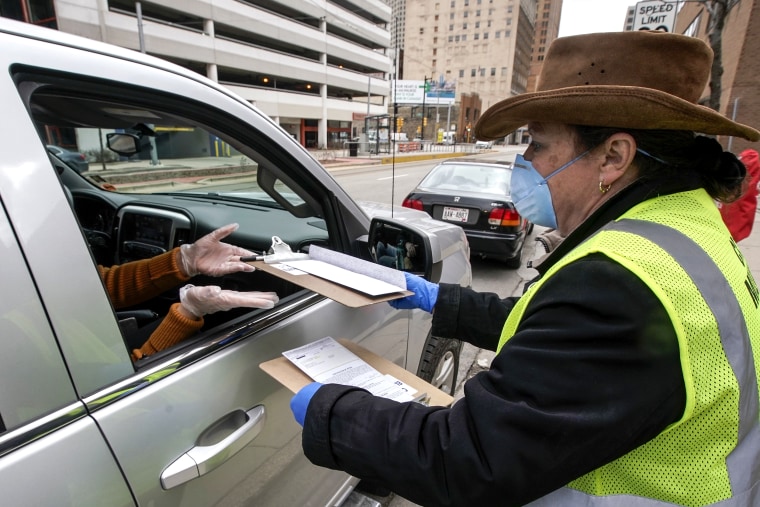A federal judge said Thursday that he lacks authority to delay the primary election next week in Wisconsin, although he blasted state officials for failing to do so.
U.S. District Judge William Conley denied an emergency request from state Democrats and voting rights groups who said the stay-at-home order prompted by the coronavirus pandemic would make voters unwilling to wait in lines to register or pick up absentee ballots or to go to the polls Tuesday.
But Conley did ease restrictions for absentee voting, requiring the state to count any ballots it receives by April 13. He also lifted the requirement that absentee voters must have their ballots signed by a witness, which was a big concern for people who live alone.
Full coverage of the coronavirus outbreak
"A consequence of these measures may be to further the public health crisis in the state. Unfortunately, that is beyond the power of this court to control," he said in a 53-page ruling issued late Thursday.
The judge declined to put his ruling on hold to give the challengers time to seek relief from the 7th U.S. Circuit Court of Appeals, saying the state needs to get on with preparing for the voting. But they still have the right to appeal.
During a four-hour hearing Wednesday, Conley said Gov. Tony Evers and the state Legislature have the authority to postpone the election. But he said they "are not willing to say there's a public health crisis and make it absolutely clear we should not be allowing poll workers and voters to congregate on April 7." Because of that refusal, the judge said, the state is "endangering the population."
The election includes the state's primary vote for president. Over a dozen states and Puerto Rico have delayed their primaries, originally scheduled from mid-March to mid-May, because of the pandemic.
Three separate lawsuits urged the judge to extend the deadline to register to vote by mail or online and allow ballots to be counted even if they arrive after Election Day, provided they were postmarked on or before April 7.
Meagan Wolfe, administrator of the state Elections Commission, told the judge Wednesday that county clerks have received more requests for absentee ballots than ever before — over 1 million, with more in the pipeline.
She said many voters might not be able to get and return their ballots in time because of self-quarantine orders.
Download the NBC News app for breaking news and politics
Evers, a Democrat, has said that state law does not give him the authority to postpone an election and that postponement could mean moving voting day to a time when the pandemic ends up being even worse. The leaders of the state Senate and Assembly have said the primary should be conducted on schedule and encouraged residents to vote by mail. They said no Democrat introduced a bill to change the election day in response to the virus.
Election officials also worry that they won't have enough poll workers willing to go to work on primary day, which has reduced the number of polling places. That, in turn, raises the prospect of longer lines at the polls that remain open. Evers said he will deploy members of the National Guard to help at the polls.
An analysis by the National Conference of State Legislatures said Wisconsin is one of a handful of states lacking explicit procedures to modify election plans in response to emergencies.
CORRECTION: (April 4, 2020, 10:26 a.m. ET): An earlier version of this article mischaracterized a federal judge’s ruling regarding Wisconsin’s primary on Tuesday. The judge said ballots will be counted as long as they are received by April 13; he did not say they must be postmarked by election day.

